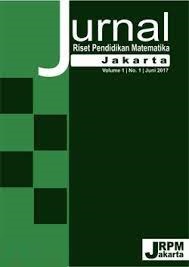The Effect of Guided Discovery Learning Model with Indonesia Realistic Mathematics Education on Creative Thinking Ability Students of SMPN 12 Bekasi
DOI:
https://doi.org/10.21009/jrpmj.v6i1.29023Keywords:
Guided Discovery Learning, Indonesian Realistic Mathematics Education Approach, Creative Thinking Ability.Abstract
The purpose of this study was to determine the effect of guided discovery learning model with Indonesian realistic mathematics education approach on students' creative thinking ability. This research method is a quasi-experiment method with posttest only control group design. The sampling technique used cluster random sampling so that the samples obtained were VII.A and VII.C classes. The data collection technique used a description test of students' creative thinking skills. Data analysis was carried out twice, namely before and after the research was conducted. Based on the results of hypothesis testing using t-test with a significance level of α = 0.05 it shows that the average creative thinking ability of students in the experimental class is higher than the average creative thinking ability of students in the control class. The value of the influence with Cohen's effect size shows a percentage of 66%. Based on the results of the study, it can be concluded that there is an effect of the application of the guided discovery learning model with an Indonesian realistic mathematics education approach on the creative thinking skills of students at SMP Negeri 12 Bekasi.
Translated with DeepL.com (free version)
References
S. K. Suci, M. Muhaimin, Z. Zurweni, “The Implementation and Effect of Problem-Based Learning Based on Local Wisdom Toward Students’ Communication and Critical Thinking Ability on Temperature and Heat Topic,” Jurnal Penelitian & Pengembangan Pendidikan Fisika, vol. 8, no. 1, pp. 165-174, 2022.
F. Bakri, B. Z. Siahaan, A. H. Permana, “Rancangan Website Pembelajaran Terintegrasi dengan Modul Digital Fisika Menggunakan 3D PageFlip Professional,” Jurnal Penelitian & Pengembangan Pendidikan Fisika, vol. 2, no. 2, pp. 113-118, 2016.
S. Sunaryo, H. Nasbey, H. Amelia, “Learning Media Development using Transformative Learning Strategy Android Application as a Distance Learning Support on Static Fluid,” Jurnal Penelitian & Pengembangan Pendidikan Fisika, vol. 7, no. 1, pp. 61-72, 2021.
Parmin, E. Peniati, “Development of Course Module Learning Strategy of Teaching Science Based on Science Result of Science,” Indonesian Science Education Journal, vol. 1, no. 1, pp. 2339-1286, 2012.
Ristanto, H. Rizhal, “Pembelajaran Biologi Berbasis Inkuiri Terbimbing dengan Multimedia dan Lingkungan Riil Terhadap Prestasi Belajar,” Jurnal Education, vol. 6, no. 1, pp. 53-68, 2011.
Sugiyono, “Metode Penelitian Pendidikan; Pendekatan Kuantitatif, Kualitatif, dan R&D,” Bandung: Alfabeta, 2012.
Sugiyono, “Metode Penelitian Kombinasi (Mix Methods),” Bandung: Alfabeta, 2015.
Wijayanto, M. S. Zuhri, “Pengembangan E-modul Berbasis Flip Book Maker dengan Model Project Based Learning Untuk Mengembangkan Kemampuan Pemecahan Masalah Matematika,” Prosiding Mathematics and Sciences Forum, pp. 625-628, 2014.
World Population Riview, “Education Rangkings by Country 2022,” Diakses Dari Education Rankings by Country 2022, (worldpopulationreview.com), 2022.




